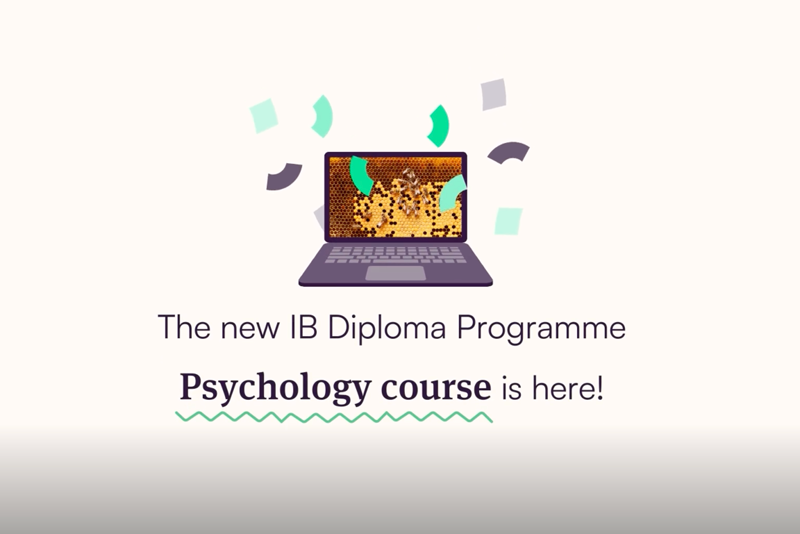Your Questions Answered: Navigating the Changes in IB DP Psychology
Thank you to all the enthusiastic educators who joined us for our recent webinar, What’s Changing in IB DP Psychology?, held on May 7, 2025.
We received a remarkable number of insightful questions during the session, and to ensure everyone can benefit from the discussion, webinar host, IB expert, and Kognity author Matt Kuykendall has summarized his answers to some of the most pressing queries.
Understanding the “Five Items” Requirement in Paper 2 Practicals
Q: How does the minimum “five items” apply to a true experiment? Does that mean five levels of the independent variable?
A: That’s a great question! In short, no. The spirit of the guideline is to ensure a robust enough design to allow for analysis and discussion.
Q: What if a student proposes using an fMRI to measure brain activity with different stimuli—how would five items apply?
A: This likely wouldn’t be acceptable. An fMRI is a measurement tool, but students are expected to design their own tool. I would advise steering students toward more appropriate proposals.
Clarifications on HL Paper 3
Q: Do Paper 3 sources focus on a single HL extension (e.g., motivation, culture, or technology) within one context?
A: Yes. Paper 3 sources will reflect one HL extension within one of the four contexts.
Strategies for Paper 2 & Research Methodology
Q: Can students reflect on the four Paper 2 questions during class practicals for revision?
A: Absolutely! While the exact questions vary, they consistently focus on:
- Knowledge
- Application
- Compare/contrast
- Design
Embedding exam-style questions as the “reflection” or “assessment” for each practical is a great way to reinforce learning.
Q: Is Paper 2 like the current HL Paper 3, in terms of applying research methods?
A: In some ways, yes—it emphasizes research knowledge application. However, the new HL Paper 3 is even more similar to the current one, especially in its emphasis on data interpretation.
Q: Is there too much focus on research methods now?
A: I don’t think so. Overall, the integration of practicals supports deeper learning and aligns with “learning by doing.”
Organizing Units and Course Planning
Q: What’s the best way to structure the course—by context, or by approach (Bio/Cog/Soc)?
A: We recommend organizing the course by context, embedding approaches content, HL extensions, and concepts as appropriate. This reflects the IB’s vision of integrated learning.
Q: What if a Context Area of Study doesn’t neatly match content learning outcomes?
A: That’s okay! For instance, “attachment” might not directly tie to one specific content outcome. What matters is that key content outcomes are addressed where relevant—e.g., chemical messengers might be covered in both Health & Wellbeing and Human Relationships.
Q: Should we teach biological/cognitive/sociocultural content separately, then move to context?
A: No. The IB guide encourages integration—teaching content within context.
Q: Are some concepts more tightly linked to specific contexts?
A: While research methods link closely to measurement and causality, most concepts are broadly applicable. Students should explore them across multiple contexts.
Internal Assessment (IA)
Q: Do students need to test their psychometric tool to assess its effectiveness?
A: No. They should instead explain their design decisions and refer to similar, established tools. Depth of discussion, not execution, is key.
HL-Specific Teaching Tips
Q: Can Kognity provide data sets for HL extensions?
A: Yes! We have included Activity Sheets at the end of every subtopic and practice questions that involve data analysis across a range of topics.
Q: How should I structure HL-only blocks in my schedule?
A: Try building inquiries around HL extensions that tie into your current unit content. This reinforces integration and relevance.
Assessment Support: Paper 1
Q: Can Kognity provide sample responses to Paper 1A and 1C without using named studies?
A: Yes. Our Assessment Material section includes exam-style questions and assessment guides.
Teaching Research Methods
Q: Should I begin the year with a unit on research methods?
A: That’s definitely a valid approach! Our “Foundations” unit was designed to either kick off the course or serve as a reference throughout.
Q: How much detail do students need to know about research studies?
A: Enough to use a study as an effective example on an exam. Detailed procedural knowledge isn’t required, but students should understand the study’s key takeaways.
About Practicals
Q: Do practicals need deadlines, or can they be integrated into classwork?
A: Practicals should be embedded in classroom learning. Whether you assess them formatively or summatively is up to you.
We hope these answers from IB expert Matt Kuykendall help you feel more confident and prepared for the new IB DP Psychology syllabus, with first teaching in September 2025. As always, Kognity is here to support you with expert-authored resources, engaging content, and community-driven professional learning.
Want to learn more?
Check out our on-demand webinars and explore Kognity’s IB DP Psychology platform.
Blog articles



